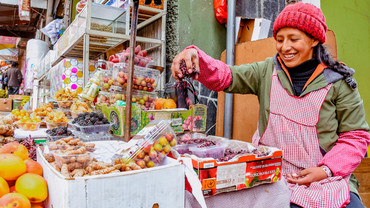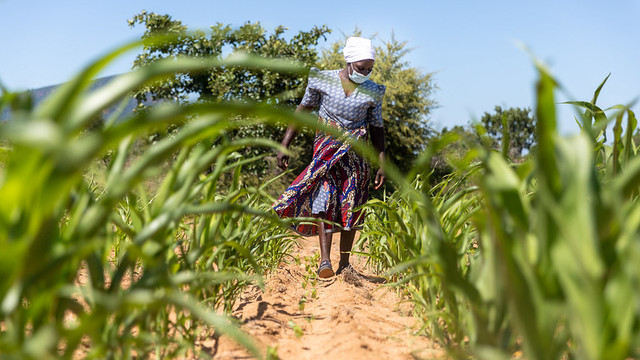The politics at play in Vietnam’s food system
Guest blogger Christophe Béné discusses how perception, personal beliefs and values can overrule science and evidence in policymaking – and how this is influencing policies and crisis narratives around food safety in Vietnam.


A woman sells fresh fish in the central market of Hoi An. Informal markets are a convenient and affordable resource for local people (Photo: Laura Billings via Flickr, CC BY-NC 2.0)
Scientists and academics like the idea that policymakers base their decisions on science and evidence; it is reassuring to assume these decisions are based on facts. It also helps scientists justify their work – making them feel like they are contributing to the decision making process.
The reality is more nuanced. There are certainly examples of policies that have been based on evidence (such as governments banning smoking in public places due to the ill effects on health). But too often we see policymakers base their decisions on perception, personal beliefs and values, and professional or political agendas. We also see how ‘crisis’ events receive more attention than those appearing less urgent.
So do those observations also apply to the political agenda around food systems? That “our food systems are failing us” and “something needs to be done” is now well documented. Across low, middle or high-income countries, poor diets are responsible for more deaths than sex, drugs, alcohol and tobacco combined. But what shapes policymakers' decisions around food systems? What drives their agenda?
Case study: Vietnam’s food safety crisis
These questions led a group of social scientists to investigate the dynamics around food system policies in Vietnam. Vietnam, its food system and associated policies are a particularly interesting case study – a prime example of a fast ‘transitioning’ middle-income country, where steep increases in incomes and rapid urbanisation are leading to significant changes in lifestyle and diets.
Based on face-to-face and online interviews of key stakeholders including government officials, policymakers and national and international experts, the study uncovered a series of interesting findings. First, it showed that the food system policy agenda in Vietnam is only partially informed by evidence, and that lobbying and advocacy are highly influential.
While this result was not, in light of the above discussion, totally unexpected, more surprising was that all the different stakeholders who were interviewed (including researchers) readily admitted this reality.
The analysis also showed food safety in Vietnam to be high on the food system policy agenda. In the past 10 years or so, Vietnam’s national media has reported on numerous food scares and food safety is an ongoing public and political concern.
The study reveals, however, that anxieties around food safety are not necessarily warranted. Compared with countries from the same region and those of a similar level of development, Vietnam has one of the highest-scoring in terms of food quality and safety. In 2017, for instance, Vietnam scored 98 (+17 above the average) in the ‘quality and safety’ indicator of the Global Food Security Index. Vietnam’s score was the best of the eight countries that were compared in this analysis.
Behind food safety, a bigger agenda…
So why do Vietnam’s policymakers exaggerate food safety concerns in this way? The answer lies in their interests to ’modernise’ Vietnam’s food system. In their view, a ‘modern country’ needs a ‘modern food system’ and across the nation, politicians are on a big push to promote supermarkets. Meanwhile, traditional wet markets and informal street vendors – deemed inefficient and outmoded – are being closed down and removed.
Entwined in the discussions on modernisation is the issue of food safety. Wet markets and informal vendors are perceived to be unhygienic and unsafe compared with supermarkets (even though data suggest a more mixed reality). Playing the food safety card helps policymakers ‘justify’ the forced closure of wet markets and their replacement by supermarkets.
Tunnel vision
The push to modernise Vietnam’s food system is disconnected from the reality on the ground. Wet markets and informal vendors are the convenient and affordable food source (in particular for fresh vegetables and fruits) for the majority. Many of Vietnam’s urban poor cannot afford to shop in supermarkets. Closing these traditional markets and stalls threatens the food security of the population. Yet the authorities choose to ignore it.
As long as food safety is chalked up as a national crisis, policymakers seem unable to engage in longer-term strategic issues around food systems. Only 2% of the policymakers interviewed flagged nutrition as a priority, even though overweight children under 5 in urban areas increased by more than 160% between 2000 and 2014, and obesity in the urban adult population had increased by 126% in 20 years – to reach 22% in 2015.
Policymakers need to move beyond the crisis narrative on food safety and re-orientate their agenda toward the longer-term structuring issues of the food systems and their underlying drivers.
This blog has been adapted from its original version. With thanks to Teresa Corcoran for editorial contributions.



